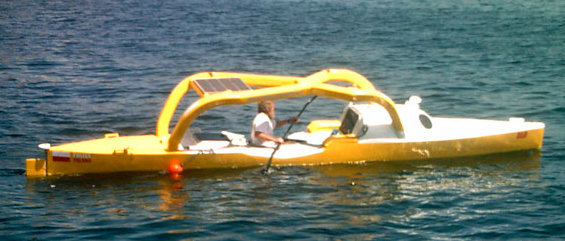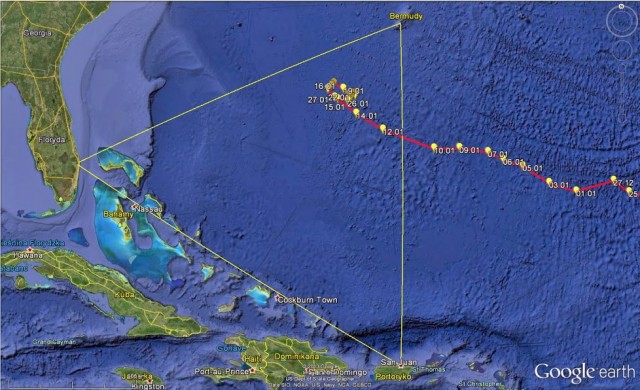If you aren’t familiar with the incredible story of Polish sea kayaker Aleksander Doba, you should be. In 2011, the then 64-year-old retired engineer splashed into the world scene when he completed a 99-day, 3,400-mile trans-Atlantic crossing from Senegal, Africa, to Brazil, South America, in his custom 21-foot kayak.
Just three years after setting the world record for longest duration ocean crossing in a kayak—and becoming just the fourth person to kayak across the Atlantic (and only the second, after Peter Bray’s 2001 crossing, to accomplish the feat enitrely under paddle power, without sail)—the 67-year-old is at it again. The indefatigueable “Olek”—as his friends and followers know him—set out from Lisbon, Portugal, on October 6, 2013, and has been paddling steadily across 5,400 miles of open ocean to his planned landfall in New Smyrna Beach, Florida.

Solo and unsupported, Olek has battled storms, prolonged saltwater exposure and multiple equipment failures over the past four months. His kayak’s claustrophobic cabin—which also stores five months’ worth of food—provides his only protection from the elements, but Doba has reported that it makes for a cramped, miserable place to rest: “I have not slept in days. The cabin is very small and noisy, with poor ventilation. I sleep a maximum of six hours a day in a few dozen installments. I am constantly tired from lack of sleep,” he texted by satellite phone in late November.
Sleep deprivation isn’t Olek’s only hardship. Strong storms pushed him back hundreds of miles early on in his trip. And in updates on his GooglePlus page, he revealed a host of maritime maladies: painful rashes and blistering on his thighs, groin and buttocks; salt lesions on his hands; and fungus beneath his finger- and toenails. Still, with characteristic good humor, he wrote, “Could be worse.”
When the sat phone failed on December 20 last year, Olek was left without communications for 47 days. Then, on February 6, Polish-American explorer Piotr Chmielinski received a text from Doba. “The physical condition of Olek is very good and he has a supply of food for at least six weeks,” Chmielinski reported, adding that Olek had been successfully receiving weather forecasts and navigational guidance from expedition coordinator, Andrzej Arminski.
Since stroking into the mid-Atlantic, Doba’s SPOT GPS tracking device showed a steady westward course, averaging about 30 miles per day. Since mid-January, however, that course has emerged as a disheartening vortex of circles. Pushed back by southwest winds and strong Gulf Stream currents, and trapped by a series of storms in the infamous Bermuda Triangle, he’s lost over 100 miles of progress over the past four weeks. Stalled out 800 miles from the Florida coast, Olek needs to expend tremendous effort just to hold his ground.

February 13th marks Olek’s 131st day at sea—nearly twice as long as any other kayaker (other than himself) in history. With favorable weather, he could reach Florida in as little as three weeks. Today, however, yet another heavy storm is swallowing the 15 miles he managed to regain on Tuesday. Nevertheless, Olek’s last text reveals he is determined to complete his epic crossing. We wouldn’t have expected otherwise from this remarkable mariner. —Virginia Marshall
Follow Doba’s trans-Atlantic progress here.









 This article first appeared in Adventure Kayak, Summer/Fall 2009. To see more boat reviews, download our free
This article first appeared in Adventure Kayak, Summer/Fall 2009. To see more boat reviews, download our free 


